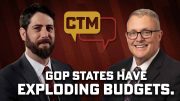U.S. Comptroller General Gene Dodaro, the man responsible for assessing the federal government’s fiscal condition, told a Senate panel Wednesday that the government will soon owe more than the entire economy produces.
During a Senate Budget Committee hearing on the Government Accountability Office’s (GAO) audit of the federal government’s fiscal year 2015 financial statements, Dodaro said that despite a modest reduction in the annual budget deficit, the national debt remains a serious and growing problem.
According to the Washington Free Beacon:
“We’re very heavily leveraged in debt,” Dodaro said. “The historical average post-World War II of how much debt we held as a percent of gross domestic product was 43 percent on average; right now we’re at 74 percent.”
Dodaro says that under current law, debt held by the public will hit a historic high.
“The highest in the United States government’s history of debt held by the public as a percent of gross domestic product was 1946, right after World War II,” he said. “We’re on mark to hit that in the next 15 to 25 years.”
Another economic projection which assumes that cost controls for Medicare don’t hold and that healthcare costs continue to increase, shows debt rising even further.
“These projections go to 200, 300 percent, and even higher of debt held by the public as a percent of gross domestic product,” said Dodaro. “We’re going to owe more than our entire economy is producing and by definition this is not sustainable.”
Of course, such projections are based on a variety of assumptions about future revenue and spending, but knowing the government’s current financial status would be a great help in arriving at appropriate assumptions. Unfortunately, the GAO audit found that for the 19th consecutive year, the government’s books were in such disarray that the agency could not render an opinion on Uncle Sam’s financial statements.
One of the primary reasons for this is that the Department of Defense — which, according to GAO, “represented 30 percent and 15 percent of the government’s reported total assets and net costs, respectively” — continues to defy attempts to audit its books. In fact, since 1996, the first year all federal agencies were required to undergo annual audits, the Pentagon’s financial statements have never been in an auditable condition. GAO said the department has “serious financial management problems” that extend far beyond cleaning up its books, including “inconsistent and sometimes unreliable reports to Congress,” an “inability to ensure that obligations and expenditures are properly recorded and do not exceed statutory levels of control,” and “provid[ing] reasonable assurance of accountability for its property, plant, and equipment.”
The Department of Housing and Urban Development and the Department of Agriculture, which together represent an additional four percent of both total assets and net costs, also could not be audited for 2015.
Another major obstacle to a full audit of the feds’ finances is “the government’s inability to adequately account for and reconcile a significant amount of intragovernmental activity and balances between federal entities,” GAO found. Simply put, if one agency purchases a good or service from another agency, the balance sheets on both sides of the transaction should register the same amount of money as either a debit or a credit, respectively; but they often do not. GAO found “hundreds of billions of dollars in differences” between agencies involved in such transactions.
Improper payments — those that should never have been made and those that were made in the wrong amounts — “are a significant and pervasive governmentwide issue,” GAO reported. Since 2003, when certain agencies were first required to report improper payments, the government has shelled out over $1 trillion more than it should have. Last year, agencies reported over $136.7 billion in improper payments, an increase of $12 billion over the prior year. GAO attributed most of the growth to “an increased error rate in Medicaid.” Though the agency did not speculate on the reason for the increased error rate, it is likely a result of the program’s expansion under ObamaCare, which has lacked sufficient controls from the outset.
In addition, GAO cited “the government’s ineffective process for preparing the U.S. government’s consolidated financial statements” as an impediment to audits.
“The government-wide financial statements that GAO audits should tell us what came in to the government’s coffers and what went out; what the government owns, and what it owes; and if its operations are financially sustainable,” Budget Committee Chairman Senator Mike Enzi (R-Wyo.) said in a statement. “But GAO’s recent audit calls into question the reliability of this underlying financial data.”
“It would be disastrous for a publicly-owned company to be unable to prove to auditors that it had a handle on how much inventory was held in its own warehouses, what condition its property is in, or the extent to which it is on the hook for potential liabilities,” Enzi added. Yet the very same entity that is plagued by such mismanagement has the audacity to micromanage private companies’ accounting practices via such laws as Sarbanes-Oxley and to demand that individuals, organizations, and businesses alike maintain scrupulously detailed records of their income and expenditures in case they are audited by the Internal Revenue Service.
There is little doubt that the U.S. government is in serious financial straits. GAO said it was difficult to assess the government’s fiscal outlook because of “significant uncertainties,” primarily concerning the growth of Medicare spending. Almost everyone, however, agrees that, as GAO put it, “absent policy changes, the federal government continues to face an unsustainable long-term fiscal path.” Estimates of Uncle Sam’s debt including unfunded liabilities such as Medicare and Social Security run from $65 trillion to $210 trillion. Good luck paying for all that without ruinous levels of taxation or inflation (or both).
The problem, as always, is not revenue but spending. Politicians have frittered away future generations’ dollars in search of present political gain. Voters, believing they are getting something for nothing, have, for the most part, ratified this course of action by reelecting these spendthrifts.
Spending must be slashed if the United States is not to go the way of other formerly prosperous nations that have been bankrupted by the welfare state. Anyone looking for direction as to what exactly should be cut need turn to only one brief document: the U.S. Constitution.




